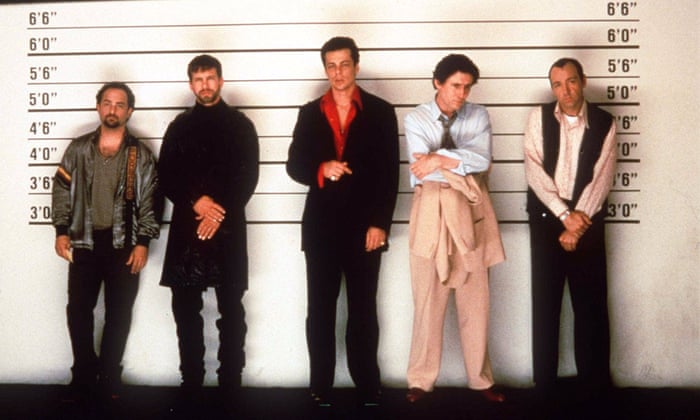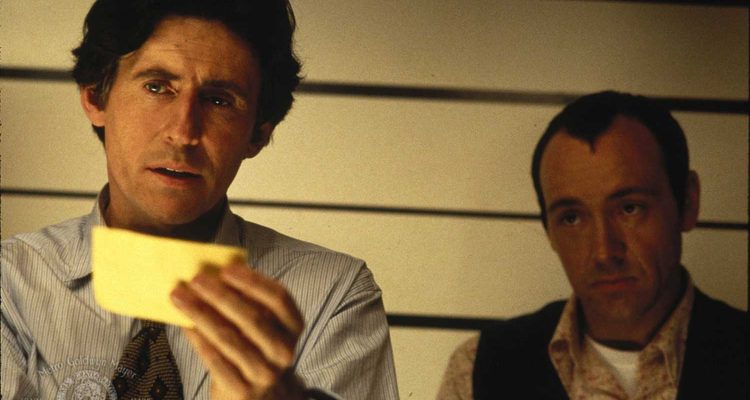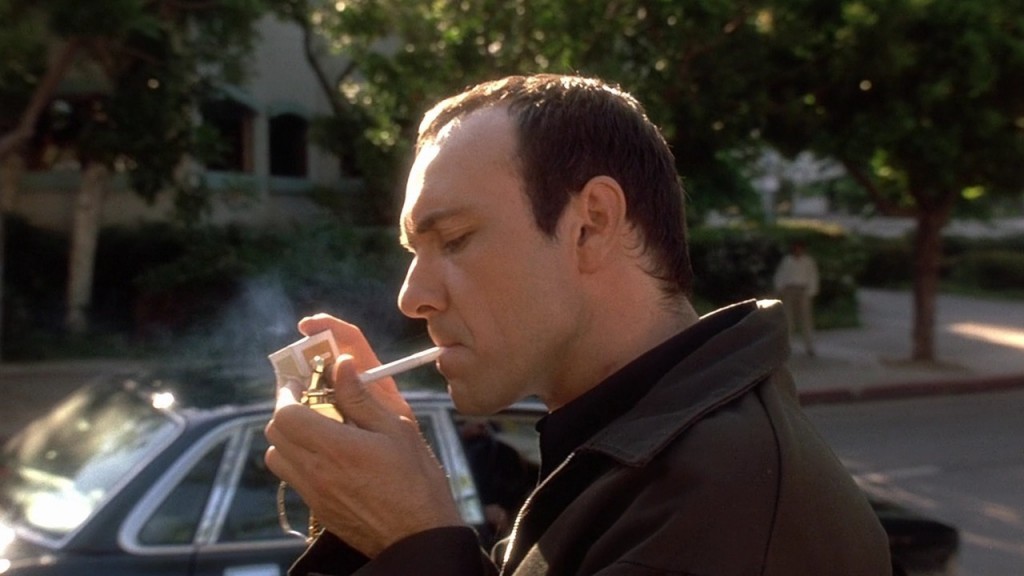Unveiling the Intricacies of "The Usual Suspects": A Cinematic Masterpiece of Deception and Intrigue
"The Usual Suspects," directed by Bryan Singer and written by Christopher McQuarrie, stands as a cornerstone of modern cinema, renowned for its intricate plot, captivating characters, and mind-bending twists. Released in 1995, the film weaves a complex narrative web that keeps viewers on the edge of their seats from start to finish. As the enigmatic con artist Roger "Verbal" Kint recounts the events leading up to a fateful heist orchestrated by the elusive criminal mastermind Keyser Söze, audiences are drawn into a world of deception, betrayal, and moral ambiguity. "The Usual Suspects" is not just a crime thriller; it's a cinematic puzzle that challenges audiences to unravel its mysteries and uncover the truth hidden beneath layers of deceit. At its core, "The Usual Suspects" is a study in the art of storytelling, employing a non-linear narrative structure and an unreliable narrator to keep audiences guessing until the final frame. From the opening scene in which a mysterious explosion sets the stage for the film's events, viewers are thrust into a world of uncertainty and intrigue. As Verbal spins his elaborate tale for the skeptical customs agent Dave Kujan, the lines between truth and fiction blur, leaving audiences questioning the reliability of every word that comes out of Verbal's mouth.
At its core, "The Usual Suspects" is a study in the art of storytelling, employing a non-linear narrative structure and an unreliable narrator to keep audiences guessing until the final frame. From the opening scene in which a mysterious explosion sets the stage for the film's events, viewers are thrust into a world of uncertainty and intrigue. As Verbal spins his elaborate tale for the skeptical customs agent Dave Kujan, the lines between truth and fiction blur, leaving audiences questioning the reliability of every word that comes out of Verbal's mouth.
Central to the film's narrative is the character of Keyser Söze, a shadowy figure whose legend looms large over the criminal underworld. Described in hushed tones by Verbal and his cohorts, Söze is portrayed as a mythic figure, feared and revered in equal measure. As the film progresses, Söze's influence becomes increasingly palpable, driving the actions of the film's characters and shaping the course of events in unexpected ways. Yet, Söze remains an elusive enigma, his true identity and motives shrouded in mystery until the film's climactic twist. One of the most compelling aspects of "The Usual Suspects" is its ensemble cast of characters, each with their own distinct personalities and motivations. From the cunning and manipulative Verbal to the volatile ex-cop Dean Keaton, the film is populated by a diverse array of criminals and misfits, each drawn into Söze's orbit for their own reasons. As the plot unfolds, their tangled relationships and conflicting loyalties add depth and complexity to the narrative, blurring the lines between hero and villain in a world where morality is anything but black and white.
One of the most compelling aspects of "The Usual Suspects" is its ensemble cast of characters, each with their own distinct personalities and motivations. From the cunning and manipulative Verbal to the volatile ex-cop Dean Keaton, the film is populated by a diverse array of criminals and misfits, each drawn into Söze's orbit for their own reasons. As the plot unfolds, their tangled relationships and conflicting loyalties add depth and complexity to the narrative, blurring the lines between hero and villain in a world where morality is anything but black and white. Central to the film's enduring legacy is its iconic ending, which ranks among the greatest plot twists in cinematic history. Without giving too much away for those who have yet to experience it, the revelation of Keyser Söze's true identity and the events that led to the film's central heist upend everything that has come before, casting Verbal's narration in a new light. Like a jigsaw puzzle coming together in the final moments, the ending of "The Usual Suspects" leaves audiences stunned and exhilarated, prompting endless debate and speculation long after the credits have rolled.
Central to the film's enduring legacy is its iconic ending, which ranks among the greatest plot twists in cinematic history. Without giving too much away for those who have yet to experience it, the revelation of Keyser Söze's true identity and the events that led to the film's central heist upend everything that has come before, casting Verbal's narration in a new light. Like a jigsaw puzzle coming together in the final moments, the ending of "The Usual Suspects" leaves audiences stunned and exhilarated, prompting endless debate and speculation long after the credits have rolled.
Beyond its gripping plot and memorable characters, "The Usual Suspects" is also distinguished by its stylish direction, atmospheric cinematography, and evocative score. Bryan Singer brings a palpable sense of tension and urgency to the film, using dynamic camera work and moody lighting to heighten the suspense of the narrative. Composer John Ottman's haunting score adds to the film's sense of unease, building tension and atmosphere throughout. In conclusion, "The Usual Suspects" is a cinematic tour de force, a film that continues to captivate and intrigue audiences with its clever plotting, memorable characters, and unforgettable twists. Through its non-linear narrative structure, unreliable narrator, and shocking revelations, the film challenges viewers to question their assumptions and expectations, keeping them guessing until the very end. Like a well-executed con, "The Usual Suspects" leaves audiences spellbound and eager to revisit its labyrinthine plot again and again, ensuring its status as a timeless masterpiece of cinematic storytelling.
In conclusion, "The Usual Suspects" is a cinematic tour de force, a film that continues to captivate and intrigue audiences with its clever plotting, memorable characters, and unforgettable twists. Through its non-linear narrative structure, unreliable narrator, and shocking revelations, the film challenges viewers to question their assumptions and expectations, keeping them guessing until the very end. Like a well-executed con, "The Usual Suspects" leaves audiences spellbound and eager to revisit its labyrinthine plot again and again, ensuring its status as a timeless masterpiece of cinematic storytelling.
With its intricate storytelling and layered characters, "The Usual Suspects" invites viewers to delve deeper into its themes and motifs, offering a rich tapestry of ideas ripe for exploration.
One theme that resonates throughout the film is the nature of identity and the masks we wear to conceal our true selves. From the enigmatic Keyser Söze to the seemingly unassuming Verbal Kint, the characters in "The Usual Suspects" are masters of deception, adept at hiding their true intentions behind a facade of normalcy. As the film unfolds, viewers are forced to confront the fluidity of identity and the ways in which our perceptions of others can be manipulated and distorted. Another theme explored in "The Usual Suspects" is the concept of fate and the role it plays in shaping our lives. Throughout the film, characters grapple with the idea of destiny and whether they are merely pawns in a larger cosmic game. As Verbal recounts the events leading up to the heist, he suggests that everything that has transpired was part of Söze's grand design, a meticulously orchestrated plan that no one could hope to escape. This notion of fate vs. free will adds an extra layer of complexity to the film's narrative, challenging viewers to question the nature of agency and accountability.
Another theme explored in "The Usual Suspects" is the concept of fate and the role it plays in shaping our lives. Throughout the film, characters grapple with the idea of destiny and whether they are merely pawns in a larger cosmic game. As Verbal recounts the events leading up to the heist, he suggests that everything that has transpired was part of Söze's grand design, a meticulously orchestrated plan that no one could hope to escape. This notion of fate vs. free will adds an extra layer of complexity to the film's narrative, challenging viewers to question the nature of agency and accountability.
Additionally, "The Usual Suspects" explores the theme of trust and betrayal, highlighting the fragile bonds that connect us to one another. As the characters navigate the treacherous waters of the criminal underworld, they must constantly weigh the risks of loyalty against the allure of self-preservation. In a world where allegiances can shift in an instant, trust becomes a precious commodity, one that can mean the difference between life and death.
Moreover, the film delves into the idea of power and its corrupting influence on the human psyche. Throughout the film, characters vie for control and dominance, willing to do whatever it takes to seize power and assert their authority over others. Whether it's Söze pulling the strings from behind the scenes or the corrupt police officers who manipulate events to serve their own interests, "The Usual Suspects" offers a chilling portrayal of the lengths to which people will go in pursuit of power and prestige.In conclusion, "The Usual Suspects" is a cinematic tour de force that continues to captivate audiences with its complex characters, intricate plot, and thought-provoking themes. Through its exploration of identity, fate, trust, and power, the film offers a rich tapestry of ideas that invite viewers to ponder the nature of human nature and the mysteries of the human condition. Like a finely crafted puzzle, "The Usual Suspects" challenges audiences to piece together its many layers and uncover the truth hidden beneath the surface, ensuring its status as a timeless classic of modern cinema.






































